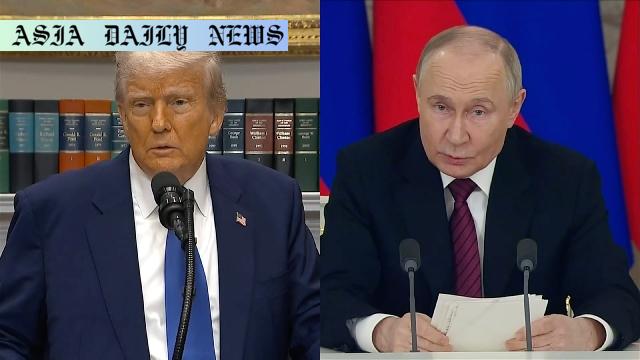Ukraine battles persist amid Trump and Putin’s awaited call, raising hope for progress despite a recent drone assault.
- US President Trump plans to speak with Russian President Putin regarding Ukraine conflicts.
- The planned call raises hopes of discussions for a 30-day ceasefire, yet Russia has not responded.
- Russian military launched its largest drone offensive against Ukraine recently, escalating tensions.

The Planned Phone Call: Trump and Putin’s Strategic Dialogue
News of a planned call between US President Donald Trump and Russian President Vladimir Putin has caught attention globally. Set to take place at 10 a.m. ET on Monday, the dialogue holds significance amidst the ongoing conflict in Ukraine. Trump’s proactive role signifies his intent to mediate and propose potential resolutions. Emphasizing the need for peace, Trump proposed a 30-day unconditional ceasefire, which Ukraine supported. However, Russian officials have yet to provide a definitive response.
The ongoing battles in Ukraine have garnered international concern. Friday’s direct negotiations in Turkey, involving delegates from Russia and Ukraine, marked the first such talks in about three years. Unfortunately, these discussions ended without a significant breakthrough. Putin’s aide, Vladimir Medinsky, defended Russia’s military actions, arguing that negotiations must proceed amid active operations. This stance raises questions about Moscow’s willingness toward peaceful settlements.
Intensified Conflict: Escalation through Drone Strikes
Meanwhile, Ukraine witnessed one of its most severe drone offensives from the Russian military over the weekend. With over 270 drones deployed, the large-scale airstrike signals intensifying aggression. The attacks reflect a strategic counteraction by Russia in response to increased international pressure. The severity of these actions diminishes hopes for an immediate settlement, casting a shadow over the upcoming Trump-Putin conversation.
Russia’s commitment to sustained military operations appears to be a move to strengthen its tactical advantage, attempting to negotiate from a position of strength. This strategy, however, risks further isolating Russia on the global stage. The humanitarian toll of such actions also cannot be ignored. Civilian infrastructures in Ukraine have faced significant damages, exacerbating the suffering of people at ground levels.
Global Perspective: The Importance of Dialogue
The upcoming phone call between Trump and Putin is anticipated to bridge critical communication gaps between the two powers. Trump’s optimistic tone on social media has raised expectations regarding the outcomes of the discussion. International observers are eagerly awaiting potential steps toward reducing hostilities, even as many remain skeptical about rapid progress.
Putin, expressing his willingness to engage, further amplifies the significance of this dialogue. Addressing Trump informally by his first name, Putin’s remarks display a personal tone, potentially conducive to easing some diplomatic tension. Yet, whether his words translate into actionable peace measures remains uncertain. Any potential success in talks could set a precedent in bilateral negotiations addressing broader geopolitical conflicts.
Challenges Ahead: Securing Effective Agreements
The road to peace in Ukraine is paved with complexities. Trump’s efforts to propose an unconditional ceasefire highlight the urgency of halting violence, but they also expose the intricate dynamics of power-play politics. Russia’s reluctance to commit to such terms, alongside its intensified attacks, indicates a deep divide in perspectives between the stakeholders.
The failure of recent Turkey talks further underscores the challenges in reaching diplomatic consensus. The perception of ‘negotiating under fire’ presents moral and ethical dilemmas, as evidenced by Ukrainian resistance to such terms. For a substantive change to occur, dialogues must pave the way for mutual compromise, where civilian safety and sovereignty remain central tenets.
Conclusion: A Glimmer of Hope Amidst Tensions
In these critical hours, the international community is counting on Trump and Putin to initiate steps that de-escalate tensions in Ukraine. The upcoming dialogue has the potential to open new avenues of peace and provide relief to millions affected by the ongoing conflict. Even as skepticism prevails, platforms for communication remain essential in navigating through this complex geopolitical crisis.
As these leaders prepare for their much-anticipated call, their dedication to achieving peace will be tested. The outcomes of their conversation could shape not just the future of Ukraine but also the broader dynamics of international relations.



Commentary
Significance of the Trump-Putin Dialogue
The scheduled phone call between President Donald Trump and President Vladimir Putin is an important step toward addressing the ongoing Ukraine conflict. The willingness of two major global leaders to engage in direct talks signals recognition of the urgency surrounding this crisis. Trump’s proactive approach in proposing an unconditional ceasefire is commendable. By urging for a 30-day peaceful period, he underscores the importance of prioritizing humanitarian concerns amidst political and military tensions.
Challenges to Diplomatic Progress
However, it is clear that significant challenges remain. Russia’s hesitation to respond to the ceasefire proposal highlights the divergent stances between Moscow and Washington. Additionally, the continuation of intensive Russian military offensives, as evidenced by the record-breaking drone strikes, signals a troubling commitment to force rather than dialogue. These factors pose considerable obstacles to any meaningful progress in discussions.
The failure of recent negotiations in Turkey further complicates efforts. Ukraine’s resolve to seek peace is evident, yet Russia’s dual strategy of negotiation and aggression reflects an unclear commitment to genuine resolutions. For lasting peace to prevail, all parties must agree on the principles of territorial sovereignty and human rights.
Hope Through Multinational Cooperation
Amid these complexities, the role of international actors cannot be underestimated. While the Trump-Putin dialogue is crucial, sustained multinational cooperation is essential to establish accountability and ensure both parties adhere to any agreements. This includes leveraging economic sanctions, diplomatic pressure, and public opinion to achieve desired outcomes.
In conclusion, this moment represents both an opportunity and a challenge. History will judge the willingness of these leaders to prioritize peace above political interests. As the world watches, one can only hope that reason and compassion will prevail.